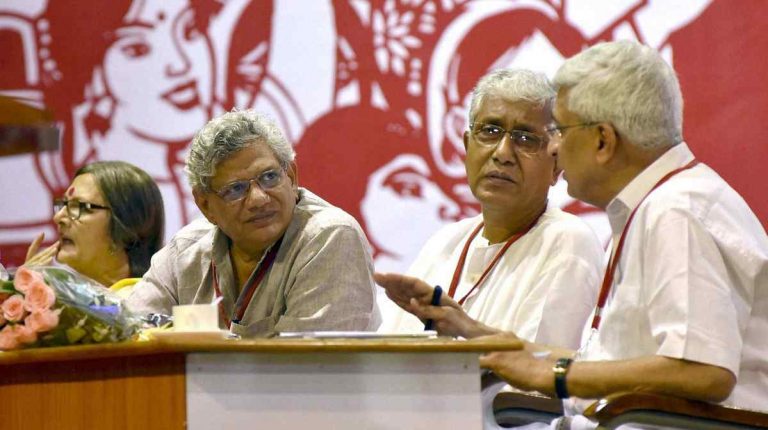
By Puneet Nicholas Yadav
CPM sources say Sitaram Yechury offered to resign as Prakash Karat’s Kerala faction killed his proposal for any pre-poll alliance with Congress
Months after ensuring that he does not get a third term in the Rajya Sabha, the Kerala faction of the CPM led by veteran Prakash Karat, on Sunday, derailed party general secretary Sitaram Yechury’s politically pragmatic proposal of entering into a pre-poll alliance with the Congress in the run up to the 2019 general election to dent BJP’s chances of retaining power at the Centre.
CPM sources, who were present at Sunday’s central committee meeting held in Kolkata, hinted that Yechury offered to resign from his post after his proposal was comprehensively rejected by his colleagues, arguing that the development would make his position as party general secretary “untenable”.
This is the second major setback for Yechury since July last year when the Prakash Karat-led faction of the party, comprising largely of comrades from the communist party’s Kerala unit and some from Bengal and Tripura, swiftly nixed the possibility of the CPM general secretary being re-nominated to the Rajya Sabha for a third consecutive term. The CPM does not offer any of its members more than two consecutive terms in Rajya Sabha. However, Yechury’s supporters had argued then that given his stature, camaraderie with leaders of other Opposition parties, brilliant oratory and firm grip on socio-political and economic issues of the country, he was the party’s best bet in the Upper House given the prevailing political situation.
If the developments in July had revealed the turmoil within a CPM that is struggling for survival ever since it lost Bengal to Mamata Banerjee’s Trinamool Congress, Sunday’smachinations at the central committee meeting further cemented the speculation of factional feuds between the Yechury and Karat camps.
Within the Left front, Yechury has always represented a moderate and politically pragmatic voice. He is known as a leader who is willing to engage with other ‘secular’ parties on political and economic issues which can help the CPM retain, if not expand, its dwindling support among the masses even if doing so dilutes the party’s more radical agenda. In stark contrast, the Karat-camp, which has Kerala chief minister Pinarayi Vijayan as one of its strongest backers, is known for its hardline outlook, one that is willing to sacrifice the party’s political standing in the hope of retaining its ideological identity.
It is this divide that political observers believe has led to the downfall of the Left in the past two decades. The hardliners had prevailed over the party to rob the late Jyoti Basu – then chief minister of Bengal – of the opportunity of becoming the country first Prime Minister from a Left party back in 1997 only because they didn’t favour the idea of the stalwart assuming the high office with the support of the Congress and other secular parties. That decision paved the way for Atal Bihari Vajpayee-led BJP and the NDA coalition to come to power at the Centre. Later, in 2004, while the Left parties did give outside support to the Congress-led UPA government, Karat as general secretary was instrumental in forcing then Prime Minister Dr Manmohan Singh to face a trust vote because the CPM didn’t agree with the Centre’s decision of signing the nuclear deal with the US. While the UPA survived the trust vote and managed to retain power – with a greater strength – in the 2009 general elections, the Left was decimated in the years that followed; wiped out of Bengal as well as Kerala. The rout continued in 2014 as the BJP, led by Narendra Modi, stormed to power at the Centre while the Left continued to fight for political survival in its erstwhile bastions.
Now, as the communists struggle to come out of their political wilderness, Yechury has been hoping that a tactical alliance with the Congress could help the party regain lost ground at least in Bengal – a state currently under the firm control of Mamata Banerjee’s Trinamool Congress but where the BJP is making significant in-roads; eating into the crammed Opposition space occupied by the Left and the Congress.
However, the argument of the Prakash Karat-Pinarayi Vijayan Kerala axis against a potential Left-Congress alliance is one that Yechury and his supporters have not been able to find a reply to. Karat and Vijayan draw their political strength from Kerala, where the Congress is the key rival of the ruling CPM. Karat believes that his party would lose credibility among comrades and supporters if it allies with its principle rival in Kerala at the Centre or in Bengal. Karat’s argument also holds true in Tripura where the incumbent CPM government under Manik Sarkar has hitherto had the Congress as its arch rival. The Tripura scenario may, however, change later this year when the state goes to polls as the BJP is investing heavily to make in-roads in the north-eastern state and is already in talks with smaller regional outfits for a rainbow coalition.
For the Congress, Sunday’s developments are at best a mini-setback. The CPM’s decision to not ally with the Congress won’t affect the Grand Old Party in Kerala where it already has a significant vote-base and strong grassroots leadership. In Bengal the Congress is a marginal player and still has the option of reviving its alliance with the Trinamool to keep itself relevant.
Karat’s decision may help the CPM retain Kerala for now but in the longer run, it could bring the party more harm just as his decision of pulling out of the UPA in 2008 – much against Yechury’s advice – did.

